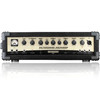Behringer ULTRABASS BX4500H Quick Start Guide - Page 7
ULTRABASS BX4500H Controls - eq settings
 |
View all Behringer ULTRABASS BX4500H manuals
Add to My Manuals
Save this manual to your list of manuals |
Page 7 highlights
12 ULTRABASS BX4500H ULTRABASS BX4500H Controls (1) (3) (5) (7) (9) (10) (11) (12) (14) (16) (19) (2) (4) (6) (8) BX4500H Front Panel (21) (13) (15) (17) (18) (20) (22) (23) (24) (25) BX4500H Rear Panel 13 Quick Start Guide (EN) Controls (1) The LEVEL VU meter reads the level that is applied to the preamp circuitry of the BX4500H. (2) These are the inputs for your electric bass guitar. The PASSIVE jack is for passive basses, the ACTIVE jack for active instruments with high output levels. (3) Use the GAIN control to determine the input gain on your BX4500H. (4) Connect your footswitch to the FOOTSWITCH jack, so as to control the sub-harmonics processor and SHAPE filter. (5) With the sub-harmonics processor switched on (see (6) ) you can add ultra-low bass frequencies to your sound by turning the ULTRABASS control (6) Press the ULTRABASS switch to enable the sub-harmonics processor. (7) The BASS control in the EQ section allows you to boost or cut the bass frequencies at approx. 50 Hz. (8) Press the DEEP switch to add low frequencies (ranging from 30 - 200 Hz) to your bass sound. (9) This control governs the upper bass-frequency range at approx. 140 Hz. (10) The MIDDLE control allows you to boost/cut the low midrange frequencies at approx. 500 Hz. (11) This control raises/lowers the high midrange frequencies at approx. 1.6 kHz. (12) The TREBLE control governs the high-frequency range on your BX4500H at approx. 7.5 kHz. (13) Use this switch to enable/disable the BRIGHT effect, which adds some brilliance to the treble frequencies in the range from 2 - 20 kHz. (14) When you enable the SHAPE filter with switch (15), you can use the SHAPE control to modify the filter sound. The filter position is adjustable in the range from 120 Hz -1.2 kHz. (15) The SHAPE switch activates the SHAPE filter. When the filter is on, the LED above the switch lights up. (16) Use the OUTPUT control to determine the overall volume of your BX4500H. (17) Connect the SEND/TUNER output to the input of your effects device, for example, our proven multi-effects processor BEHRINGER VIRTUALIZER PRO DSP2024P. (18) Connect the RETURN jack to the output of your effects device. Since the BX4500H features a serial effects path, the mix ratio must be set on your effects device. (19) Use the balanced D.I. XLR output to feed the audio signal from your ULTRABASS to an external mixing console. (20) Use the LINE OUT jack to connect your BX4500H to a mixing console that has no balanced inputs and/or to provide a signal that is independent of all settings adjusted on the BX4500H. (21) Use the POWER switch to switch the BX4500H on or off. (22) MAINS CONNECTION. (23) FUSE HOLDER/VOLTAGE SELECTOR. (24) SERIAL NUMBER. (25) Use the SPEAKER outputs to connect your loudspeakers. The outputs are wired in parallel on two ¼" jacks and a professional loudspeaker connector. Check Out behringer.com for Full Manual















